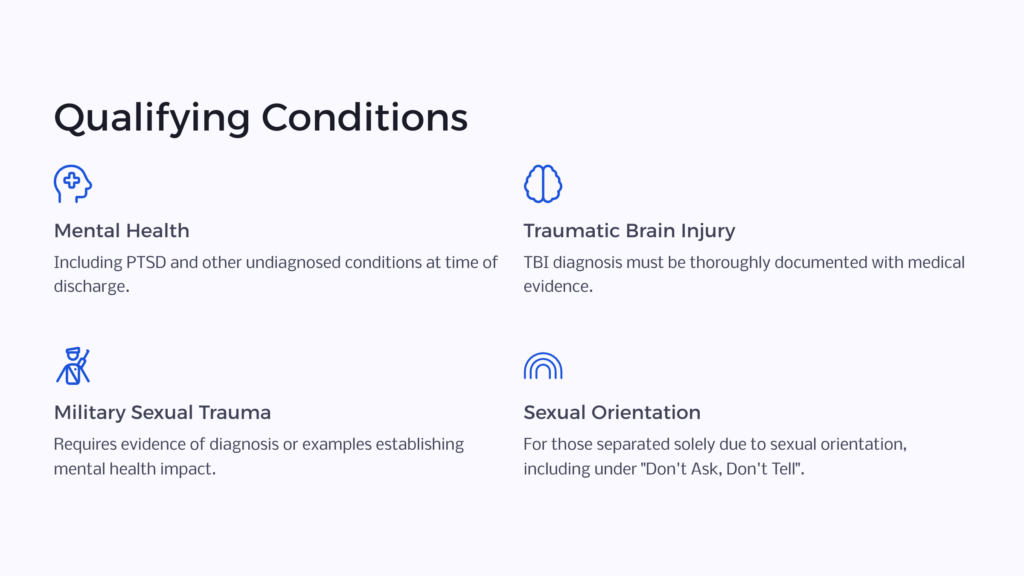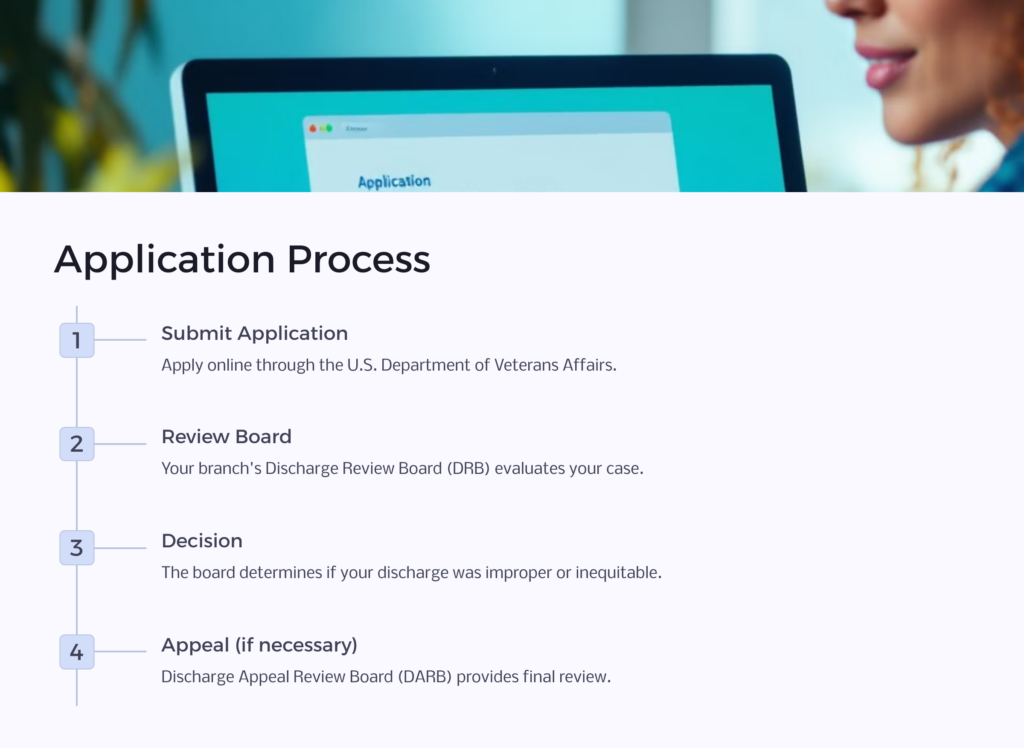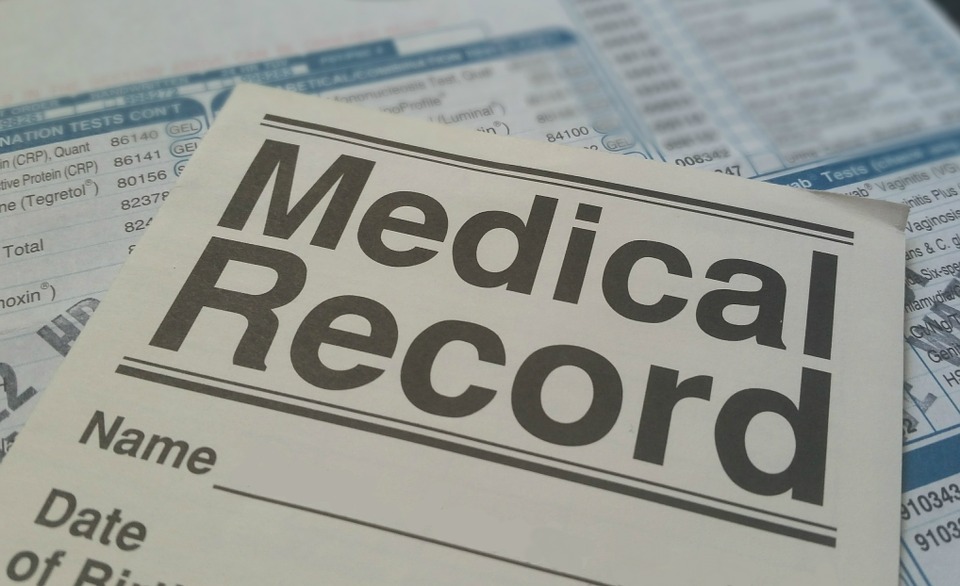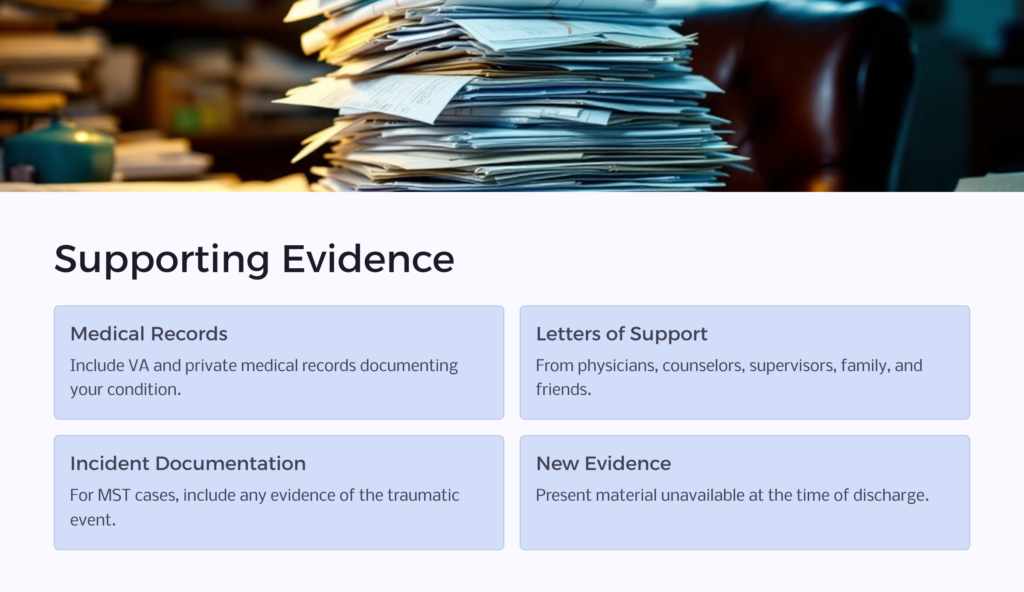If you did not receive an honorable discharge from the U.S. military, it may be possible to apply for an upgrade to your military discharge status. The process for requesting an upgrade can be laborious and lengthy, so it’s best to go into it knowing what to expect. It’s also important to know which circumstances are most likely to lead to a service upgrade.

In recent years, the U.S. Department of Defense has put into place measures that allow veterans who received less than honorable discharges to have their cases reviewed, and in instances where their status is determined improper or inequitable, to have their status upgraded.
4 Conditions That Qualify for a Military Discharge Upgrade
- Mental Health Conditions
- Traumatic Brain Injury (TBI)
- Military Sexual Trauma
- Sexual Orientation (including under the Don’t Ask, Don’t Tell policy)
Some veterans may want to request an upgrade to their military discharge status because their current status prevents them from receiving VA benefits. Other veterans seek an upgrade because they feel their current status does not accurately reflect the level of service and sacrifice they made to their country.
In either case, it’s often difficult to obtain a military discharge upgrade – the information here may help your case, and many veterans find it’s worthwhile to partner with an experienced and knowledgeable VA attorney to help guide them through this process.
Typically, one of two types of review boards will study a veteran’s discharge circumstances and issue a ruling—a Discharge Review Board or a Board of Correction for Military Records. In general, you can request a review by a Discharge Review Board by submitting an application, which is available online, to your particular branch of service.
To qualify for a military discharge upgrade, you must show that the original status is either improper or inequitable – meaning the original ruling was either factually incorrect, inconsistent with existing law, or inconsistent with the traditions and policies of the service branch.
4 Conditions That Qualify for a Military Discharge Upgrade

There are four primary conditions that are likely to qualify a veteran for a military discharge upgrade – we’ve listed them for you below:
1. Mental Health Conditions
If a mental health condition (including post-traumatic stress disorder) wasn’t fully documented or diagnosed at the time of discharge, you may be able to obtain a discharge upgrade. For many years, some mental health conditions went undiagnosed and veterans were separated from service instead of receiving appropriate treatment.
If this is true for your situation, you will need to include documentation from a licensed medical professional with your application. Include any evidence that documents your mental health issues, such as other medical records, police reports, or letters from friends and family about their observations of your struggles. If it becomes clear that you should have received mental health treatment while on active duty, you may be eligible for an upgrade.
2. Traumatic Brain Injury (TBI)
Much like PTSD and other mental health conditions, a diagnosis of traumatic brain injury must be thoroughly documented and backed with medical evidence. If TBI is the reason for your upgrade request, be sure to include all relevant medical documentation to help support your claim. Any medical evidence currently available that reviewers did not see when issuing your original discharge is helpful to strengthen your case.
Mental health issues like PTSD and traumatic brain injury were poorly understood until fairly recently – meaning that many veterans failed to receive an honorable discharge if they struggled with these conditions. Their behavior may even have been misinterpreted as willful misconduct.
In retrospect, the U.S. Department of Veterans Affairs has instructed review boards since 2014 to take a generous view of requests for discharge upgrades from veterans with a documented history of mental health challenges or TBI. In 2016, the DoD waived the statute of limitations associated with these discharge upgrade requests.
3. Military Sexual Trauma
To receive a discharge upgrade related to military sexual trauma, a veteran must show medical evidence of a diagnosis, or provide examples that help establish a mental health condition. It also helps the claim if the veteran can show evidence that they experienced an event such as sexual assault or sexual harassment that affected their mental health in a significant way.
An application for discharge upgrade also should explain how the condition resulting from MST caused the basis for the veteran’s current discharge status. In this case, evidence supporting sexual assault or harassment could come from the veteran’s service record or the following outside sources:
- Law enforcement records
- Hospital records
- Mental health counseling records
- Pregnancy tests
- Rape crisis center records,
- Physician notes
- Tests for sexually transmitted diseases
- Statements from friends, family, coworkers, and community leaders
The documentation should describe the sexual trauma and how it affected the veteran. Additional evidence might include any requests for transfer, documented changes in behavior after the incident, and documentation of depression, anxiety, or panic attacks.
4. Sexual Orientation (including under the Don’t Ask, Don’t Tell policy)
LGBTQ veterans who were separated from service solely because of their sexual orientation also are eligible to be considered for a discharge upgrade. This type of separation affected as many as 114,000 military members between World War II and the 2011 repeal of the U.S. military’s “Don’t Ask, Don’t Tell” policy.
Frequently Asked Questions
You may have additional questions about the process of qualifying for a military discharge upgrade. We’ve gathered some of the most common questions and their answers below for your reference.
Where Do I Apply for a Discharge Upgrade?

Veterans can apply for a discharge upgrade through the U.S. Department of Veterans Affairs. The VA offers a simple online form through which veterans can submit their applications and supporting documentation. The form will direct you to your specific branch of service so that your application ultimately is reviewed by the Discharge Review Board for that branch.
Why Should I Upgrade My Military Discharge?
There are several reasons to upgrade your discharge status. The first is intangible and relates to the pride and honor associated with your military service. If you were discharged in such a way that fails to honor your commitment to your country, upgrading your discharge status is a major step toward recapturing the respect you are due because of your service.
On a more tangible note, if you received one of the types of military discharge other than an honorable discharge from military service, that designation may affect your ability to claim benefits from the VA, including GI Bill benefits, VA loans, VA health care, and more. In some cases, a higher discharge rating can make a veteran eligible for other state-level benefits, including employment preference.
Please note, however, even if you received a less than honorable discharge, you might be eligible for some level of VA benefits, especially if you’re seeking benefits to help cover mental health services related to PTSD or other mental health challenges linked to your service. This includes any condition related to experiencing military sexual trauma.
What Is the Discharge Review Board (DRB)?
Each branch of military service has its own Discharge Review Board, which bears responsibility for reviewing all requests for discharge status upgrades. It typically comprises five officers from that branch of service.
Each board follows the same general guidelines for reviews as set forth by the U.S. Department of Defense. When a veteran applies for a review, they can request an in-person hearing with the DRB, or the veteran can request a decision based solely on the documentation provided.
What Is the Discharge Appeal Review Board (DARB)?
The Discharge Appeal Review Board provides final review of discharge upgrade requests for those who separated from service after Dec. 20, 2019. The DARB only reviews a case when the veteran has exhausted all other available administrative review options. This new appeal board was announced by the U.S. Department of Defense in April of 2021 and represents the final level of administrative review provided by the DoD.
What Is a Character of Discharge Review?
Even without an official military discharge upgrade, the U.S. Department of Veterans Affairs may choose to grant all benefits except the GI Bill to veterans with a less than honorable discharge. If the VA determines that a veteran’s overall service wasn’t “under dishonorable conditions,” this change in veteran status is called a Character of Discharge review.
This review does not change a veteran’s formal discharge with the U.S. Department of Defense, but it does affect how the VA elects to grant veterans benefits. Please note that the VA will not complete a Character of Discharge review for you unless you apply for a specific benefit – so it’s worth applying even if your current discharge status is less than honorable.
Can I Apply Again If My First Application for Discharge Upgrade Was Denied?
Yes. A portion of the application will ask if you’ve previously applied, so make sure to select, “yes” when you reach that point. Your second application for discharge upgrade is more likely to be successful if you have new evidence or documentation that strengthens your claim.
If the U.S. Department of Defense has changed or updated any relevant policies, you may be in a good position to submit a second application for a discharge upgrade. If you’re applying under new guidelines, your branch of service will treat your upgrade request as a completely new case.
What Evidence Should I Include?

Remember that your goal with this application is to present material evidence that was unavailable at your time of discharge. Supporting documentation should strengthen your claim that you received an improper discharge status when you separated from service.

Evidence may include VA military medical records, VA medical records, or medical records from a private medical practitioner. In many cases, you can request that a treating physician or counselor write a letter of support for your claim. It’s often helpful to include letters from supervisors, family, and friends outlining how the mental health condition has affected your daily life.
If you are applying for a discharge upgrade related to military sexual trauma, any documentation or evidence you have surrounding the MST event and your response can help illustrate how the experience may have affected your discharge status.
Upgrading Your Military Discharge Status
If you think you received an inappropriate discharge status when you separated from military service, it’s worth your time and attention to find out whether you’re eligible for a discharge upgrade.
With the right kind of documentation, you can strengthen your claim and successfully upgrade your military status. The application process can be frustrating, but you don’t have to do it alone. If the task feels overwhelming, you can always work with a VSO or lawyer to help you gather the information you need to make your case. So don’t wait—get started today on making sure you can access the VA benefits you’ve earned through service to your country.
 Benefits.com Advisors
Benefits.com Advisors
With expertise spanning local, state, and federal benefit programs, our team is dedicated to guiding individuals towards the perfect program tailored to their unique circumstances.
Rise to the top with Peak Benefits!
Join our Peak Benefits Newsletter for the latest news, resources, and offers on all things government benefits.




















